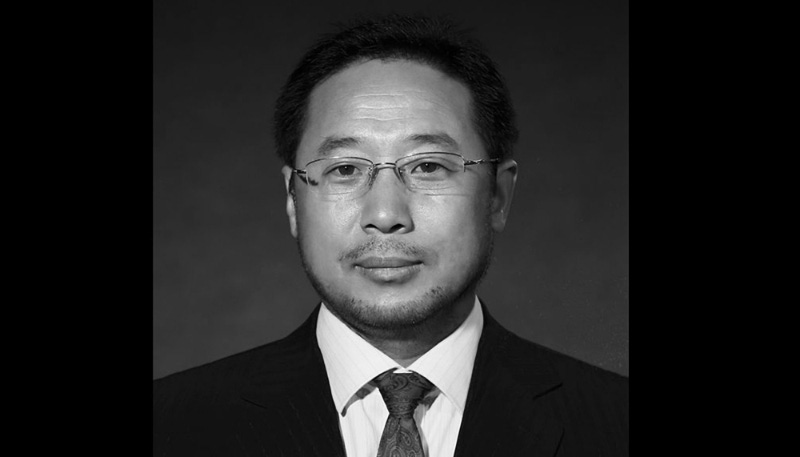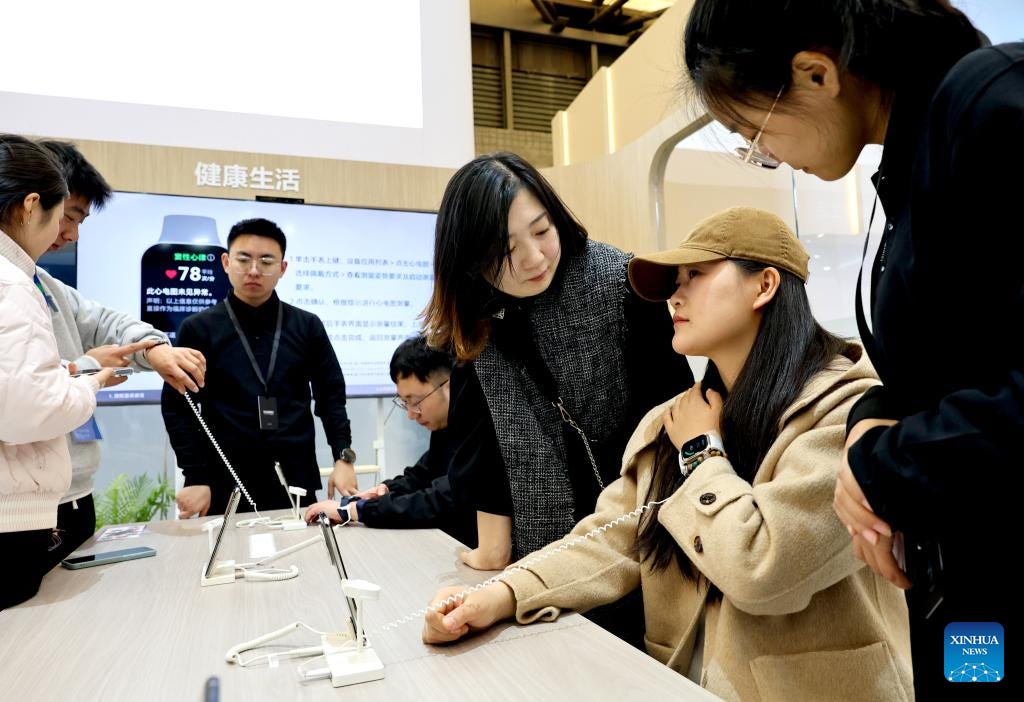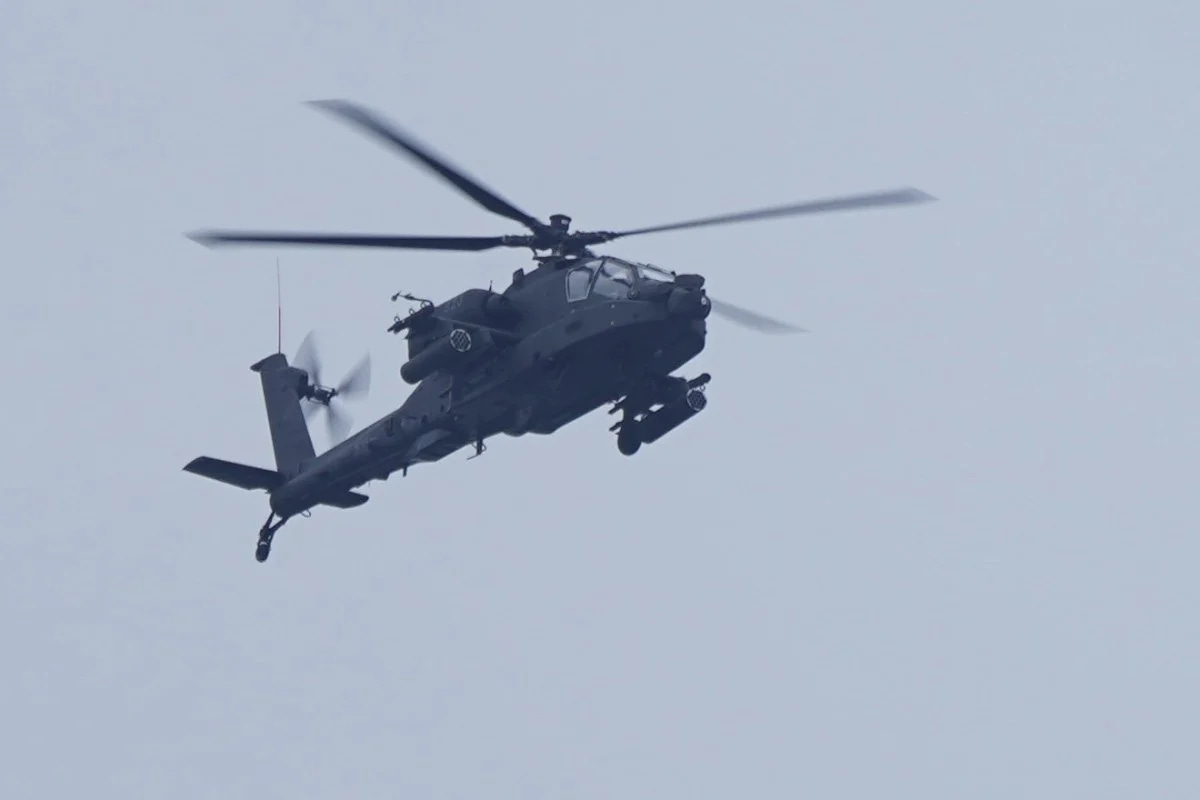China This Week: Musk Briefed on China Conflict, ICBC’s $11B Tech Fund, CEOs to Meet Xi
This week's Beyond the Great Wall provides an overview of key developments within China, along with insights into its foreign affairs.
Decypher would like to bring you the third edition of the Decypher Journal, which is based on the theme of Demography—exploring how population shifts are reshaping economies, societies, and global politics. This issue unpacks the numbers behind migration, fertility, ageing, and identity, asking: who gets counted, and who gets left behind?
China Quote 🗩
"We observed five objects in space moving in and out and around each other in synchrony and in control, That's what we call dogfighting in space - they are practicing tactics, techniques and procedures to do in-orbit space operations from one satellite to another."
General Michael Guetlein, the vice chief of space operations
Economic Activity🏦
China’s Economy Requires More Effort to Sustain Recovery
Zhong Zhengsheng writes in Caixin that despite a strong start to 2025, China’s economic recovery remains fragile. Official data suggest GDP grew 5.2% year-on-year in January-February, but manufacturing investment outpaced demand, limiting price recovery. Government-driven fixed-asset investment may not sustain momentum without private sector participation. While real estate inventory reduction showed progress, retail sales growth slowed, and unemployment rose to 5.4%, particularly impacting rural migrant workers. Further policy efforts are needed to stabilise recovery.
BofA Warns of Chinese Stock Correction ‘Soon’ in 2015 Repeat
Business Times reports that Bank of America (BofA) strategists caution that China’s stock rally may face a sharp correction, drawing parallels with the 2015 boom and bust cycle. The Hang Seng China Enterprises Index and MSCI China Index have surged over 30% since mid-January, mimicking pre-crash trends. Concerns include weak job growth, deflation risks, and speculative bubbles in tech sectors. Despite bullish sentiment, BofA warns the rally—driven by policy optimism and fading US market confidence—remains vulnerable to economic and geopolitical uncertainties.
Inside China🐉
Hu Shisheng, the Spymaster-Academic Behind China's South Asian Intelligence Strategy

Intelligence Online reports that Hu Shisheng, a senior research fellow at the China Institutes of Contemporary International Relations (CICIR), plays a pivotal role in shaping China’s intelligence strategy in South Asia. Despite operating under the guise of academia, CICIR’s ties to Guoanbu (China’s Ministry of State Security) suggest Hu is more than a scholar, particularly on sensitive issues like Tibet. His analysis of India’s diplomacy and China’s strategic interests in the region reflects insider knowledge. While no direct evidence of espionage exists, his denied entry into France underscores growing Sino-Western tensions.
Former National Legislator Arrested for Bribery
China Daily reports that Du Yubo, former vice-chairman of the Education, Science, Culture and Public Health Committee of the 13th National People's Congress, has been arrested on bribery charges. The Supreme People's Procuratorate stated that Du’s case was referred for prosecution following an investigation by the National Commission of Supervision. A former vice-minister of education, Du had been under investigation since September 2024.
China Sentences Ex-Engineer to Death for Alleged Spying
ABC News reports that a former Chinese engineer, surnamed Liu, has been sentenced to death for allegedly leaking state secrets to an unnamed foreign intelligence agency. China’s Ministry of State Security stated that Liu secretly copied classified materials from his former employer and later sold them abroad. The case highlights Beijing’s intensified crackdown on espionage, with officials warning of foreign efforts to undermine national security. No details were provided on when the execution would take place.
Hong Kong's Baptist University Turned into CCP Standard-Bearer
Intelligence Online reports that Hong Kong Baptist University has become a model for academic collaboration between mainland China and Hong Kong under a leadership closely aligned with the Chinese Communist Party (CCP). The university’s president has actively fostered ties with the CCP, transforming the institution into a symbol of Beijing’s growing influence in Hong Kong’s academic sphere.
China’s delivery platforms compete to offer better worker benefits
William Langley writes in the Financial Times that Chinese delivery giants Meituan and Ele.me are expanding social insurance benefits for riders amid regulatory pressure and new competition from JD.com, which recently entered the food delivery space with promises of full benefit coverage. Analysts note the lack of clarity in the announced schemes and highlight ongoing labour concerns in the gig economy.
China and the World🌏
Pentagon Set Up Briefing for Musk on Potential War With China
Eric Schmitt, Eric Lipton, Julian E. Barnes, Ryan Mac and Maggie Haberman write in The New York Times that the Pentagon planned to brief Elon Musk on top-secret U.S. military strategies for a potential war with China, raising concerns over conflicts of interest due to his business ties in China. Officials later denied the session involved war plans, calling it an informal meeting on innovation.
Canada Condemns China’s Execution of 4 Canadians on Drug Convictions
The New York Times reports that Canada has strongly condemned China’s execution of four Canadian nationals convicted on drug charges. Foreign Minister Mélanie Joly stated that Canada had urged Beijing for leniency and would continue advocating for other Canadians facing similar situations. The executions, which took place in Guangdong, mark a rare instance of multiple foreign nationals being put to death within a short time. Relations between Canada and China have remained strained, particularly since the 2018 detentions of Michael Kovrig and Michael Spavor following Canada’s arrest of Huawei executive Meng Wanzhou.
Foreign CEOs to Flock to China for Key Summit, Xi Meeting
Laurie Chen writes in Reuters that dozens of foreign CEOs, including leaders from Qualcomm, FedEx, Siemens, and BMW, will attend the China Development Forum in Beijing on March 23-24. The summit, aimed at boosting foreign investment, comes amid heightened US-China tensions and declining FDI. A select group of CEOs may meet Xi Jinping on March 28. While European participation has increased, fewer US executives are expected due to scrutiny in Washington. The forum will emphasise consumption and medical sector development.
China is Practicing ‘Dogfighting’ in Space, Space Force Says
Defense One reports that China has been conducting coordinated satellite maneuvers that resemble "dogfighting in space," according to U.S. Space Force Vice Chief Gen. Michael Guetlein. Observations indicate five Chinese satellites executing synchronized orbital movements, suggesting they are testing techniques for space-based combat. The Space Force has also flagged other threats, including satellites with grappling arms and "nesting dolls" capable of launching anti-satellite weapons. Guetlein warned that the U.S. must accelerate its space superiority efforts as the capability gap with China and Russia narrows.
Taiwan Warns of Potential 2027 Chinese Invasion
Dylan Malyasov writes in Defence Blog that Taiwan’s Defence Ministry has, for the first time, officially identified 2027 as a potential year for a Chinese invasion, reflecting growing military tensions with Beijing. The annual Han Kuang Exercise will be extended to 10 days to enhance combat readiness. While Taiwanese officials downplay the timeline, analysts suggest it could pressure lawmakers to increase defence spending. U.S. officials have long warned of China’s military build-up targeting Taiwan by 2027, though internal PLA corruption and strategic challenges remain.
Taiwan Holds Combat-Readiness Drills in Response to PLA ‘Grey-Zone Provocations’
Lawrence Chung writes in South China Morning Post that Taiwan has launched five days of combat-readiness drills following a large-scale People’s Liberation Army (PLA) operation near the island. The PLA deployed 68 warplanes and nine naval vessels, with 43 aircraft crossing the Taiwan Strait’s median line. Taiwan’s Defence Minister Wellington Koo warned of escalating tensions, accusing Beijing of using grey-zone tactics to destabilise the region. The drills simulate real-time responses to potential PLA attacks, including amphibious assaults, amid heightened cross-strait tensions.
Chinese LiDAR maker rejects report backing U.S. claims it supplies China’s military
Elaine Kurtenbach writes in AP News that Hesai, China’s top LiDAR supplier, has denied links to the Chinese military after short-seller Blue Orca Capital alleged such ties. The report caused a 10% drop in Hesai’s stock. The company, which has sued the U.S. government, maintains it complies with all regulations and rejects claims of military association.
EU Probes BYD Plant in Hungary Over Unfair Chinese Subsidies
Andy Bounds, Henry Foy, and Marton Dunai write in Financial Times that the European Commission has launched an investigation into whether Chinese EV giant BYD received unfair state subsidies for its €4bn electric car plant in Hungary. If violations are found, BYD could face asset sales, reduced capacity, or fines. The probe highlights EU concerns over Chinese investments in Hungary under Viktor Orbán, who has deepened ties with Beijing. Brussels has previously imposed tariffs on Chinese EVs and warned that investments in the bloc must ensure local economic value and technology transfer.
BYD Mulls Third European Plant in Germany
Phate Zhang writes in CnEVPost that Chinese EV giant BYD is considering establishing its third European car assembly plant in Germany. The move aligns with its strategy to build brand recognition in Europe. However, internal debates persist due to Germany's high labour and energy costs. BYD is reportedly following Chinese government directives to avoid investments in EU countries that support tariffs on Chinese imports. The final decision will depend on sales performance and the capacity utilisation of its Hungarian and Turkish plants, set to produce 500,000 vehicles annually.
American Maritime Regulator Calls for Levy on Chinese Ships at Port

Oliver Telling writes in Financial Times that Louis Sola, the newly appointed chair of the Federal Maritime Commission (FMC), has proposed imposing fees of up to $1.5 million on Chinese-built ships docking at U.S. ports to fund subsidies for American shipbuilders. The proposal, supported by the Trump administration, aims to counter China’s dominance in global shipbuilding. Experts warn that such measures could lead to port congestion and increased import costs. The FMC is assisting the U.S. Trade Representative in reviewing the plan ahead of a final decision.
How Billionaire Li Ka-Shing’s Panama Deal Raised the Ire of China
Filipe Pacheco and Shirley Zhao write in Bloomberg that Hong Kong tycoon Li Ka-shing's $19 billion sale of his Panama Canal port assets to a BlackRock-led consortium has angered Beijing. The deal, seen as a win for US President Donald Trump, is being scrutinised by Chinese regulators for potential security breaches or antitrust violations. China had reportedly planned to use the port issue as a bargaining chip in trade negotiations with Washington. While Beijing has few options to reverse the sale, the move signals growing tensions in US-China geopolitics and a potential backlash for Li’s business empire.
Acid Spill from Chinese-Owned Copper Mine Contaminates Vital Waterway in Zambia
MINING.COM reports that a tailings dam collapse at the Sino-Metals Leach Zambia mine has released 50 million litres of toxic waste into the Kafue River, threatening Zambia’s primary waterway. The spill, containing acid and heavy metals, has shut off water supplies to Kitwe and raised alarms among authorities, including President Hakainde Hichilema. The mine’s Chinese owner has apologised and pledged environmental restoration, but experts fear long-term ecological damage.
Sales of Vietnamese doll plunge over face marking like China’s ‘nine-dash line’

Helen Davidson writes in The Guardian that sales of the popular Chinese-made Baby Three doll have collapsed in Vietnam after claims a face marking resembled China’s disputed “nine-dash line.” Authorities ordered inspections, citing national security concerns, prompting retailers to halt sales and slash prices amid public backlash over perceived violations of Vietnam’s sovereignty in the South China Sea.
Tech in China🖥️
China’s ICBC launches $11.04b tech fund
Tech in Asia reports that the Industrial and Commercial Bank of China (ICBC) has launched an 80 billion yuan (US$11.04 billion) fund to invest in “hard tech” sectors like semiconductors and advanced manufacturing. ICBC Chairman Liao Lin said the fund supports private enterprises and reflects central leadership goals, promoting long-term “patient capital” over short-term returns.
Chinese EV Maker BYD Says Fast-Charging System Could Rival Petrol Refuelling Speed
Jasper Jolly writes in The Guardian that BYD has unveiled a new fast-charging system capable of delivering 1,000 kW of power, allowing EVs to gain 400 km of range in just five minutes. The innovation, which outpaces Tesla’s superchargers, sent BYD’s shares to a record high. The company also announced plans to install 4,000 "flash-charging stations" across China. The move intensifies competition in the EV market as Tesla struggles with declining sales and investor concerns over CEO Elon Musk’s political affiliations.
De/Cypher Data Dive📊
BYD has introduced a revolutionary new charging system in China, capable of fully charging its latest models in just five minutes, offering a range of 250 miles. In comparison, Tesla's Superchargers take 15 minutes to charge and provide a range of 200 miles.
Tesla’s annual global deliveries declined for the first time last year, and it faces mounting challenges in China.
Image of the Week📸

- - -



